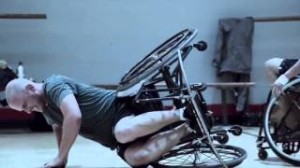 Every grimace and smile lights up the screen–the intense looks and clumsy maneuvers, the enthusiastic shouts and hand slaps. And the song–well, it certainly fits: “And I built a home/ for you for me/This is a place where I don’t feel alone/This is a place where I feel at home” (“To Build a Home”, The Cinematic Orchestra). Certainly no one would suspect I was talking about a beer commercial. Many of you have probably already seen it, but for those who haven’t, please take a moment to watch before reading on. I wouldn’t want to spoil it for you.
Every grimace and smile lights up the screen–the intense looks and clumsy maneuvers, the enthusiastic shouts and hand slaps. And the song–well, it certainly fits: “And I built a home/ for you for me/This is a place where I don’t feel alone/This is a place where I feel at home” (“To Build a Home”, The Cinematic Orchestra). Certainly no one would suspect I was talking about a beer commercial. Many of you have probably already seen it, but for those who haven’t, please take a moment to watch before reading on. I wouldn’t want to spoil it for you.
Six guys roll wheelchairs down a polished, wood court—intense and enthusiastic. You watch the game unfold with a missed shot, awkward rebound, clumsy dribbling, then the tide turns with some creative assists, followed by a banked three-pointer, and an off-the-rim shot, all driven by a special camaraderie that makes this commercial genuinely intriguing. But it’s not the game they’re passionate about. The smiles are instant, connective responses to their teammates. They have a child-like giddiness as they wheel their way around, stumbling over each other with a poorly defined defense/offense, intertwined in spokes and rims–crashing wheelchairs.
And then for the surprise: as the last shot bounces off the rim and tips into the basket, they exchange delighted glances and cajoling slaps, and immediately stand up. What? Yes, all but one stand up. And that one declares his delighted affirmation that they’re getting better at their clumsy attempts to play his game.
If you weren’t already confused about what you were watching, this seals the deal. And all the while, it’s being layered with an inviting voice projecting conviction: “ Dedication…loyalty…friendship: The choices we make reveal the true nature of our character.”
Did I really just hear that? Was it really coming from a beer commercial? Is it just me, or are most of us (and every other article discussing this commercial) accustomed to a more superficial commentary on beer-drinking men?
All of this is still building momentum to the articulated metaphor at the end. The moment where all six men gather around a table, delighted for the fellowship that comes after the hard work of respectful, humble curiosity, and then it ends with this line: “Guinness: Made of More”.
More of what? The branding is amply clear that men are made of more than superficial and impulsive desires, and, according to the commercial, so is Guinness.
I already have a profound respect for the Guinness family. I’m reading a book on the collective accomplishments of this remarkable lineage in and out of the brewery, and there are countless stories of their impact on politics, law, business, the financial industry, and the church. They have also historically made some avant-garde decisions to care for their employees and communities–decisions that were imbued with compassion and hope. The legacy of the Guinness family is clearly represented in this commercial.
So, what are they really driving at, here? If you’re anything like me, you’re immediately drawn into a combative and intense dialogue with your own character. “Am I made of more? What would that even look like?” And so the contemplative question comes with a definitive answer: What does it mean to be, “Made of more”? The commercial preaches substance, quality, and the essence of real manhood; which could also include real womanhood.
The reality of what it means to be substantive, as defined by this commercial, reaches its pinnacle in the end. For the sake of didactic value, let’s sum it up in one word: community. Real manhood (and womanhood), in this context, is defined in terms of real community. Community is valued connection, respectful sacrifice, and humble curiosity, to name a few. These men have made an art form of dropping into wheelchairs week after week and letting go of their previous muscle memory to begin a humbling adventure into a new experience of their beloved sport. Why? For the sake of a guy they truly care about.
How many of us have taken such a posture to learn about someone we care for? Not many, I would imagine. To choose to re-learn a skill and see it from another’s perspective, well, let’s just say it’s not a natural, human response, and not something most of us aspire to.
The commercial ends with the guys gathered together at their local watering hole. With its understated quality, the metaphor can get lost. The decision to eat and drink together is representative of the great acquiescence to share life and community.
Have you experienced this type of community? Would you be willing to engage in respectful curiosity to find it? This type of embodied community is the very stouthearted experience most of us long for, but don’t know how to articulate or ask.
